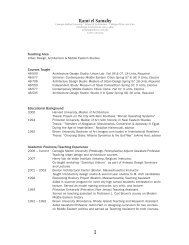A Bias in the Prediction of Tastes - Carnegie Mellon University
A Bias in the Prediction of Tastes - Carnegie Mellon University
A Bias in the Prediction of Tastes - Carnegie Mellon University
You also want an ePaper? Increase the reach of your titles
YUMPU automatically turns print PDFs into web optimized ePapers that Google loves.
I995] THE PREDICTION OF TASTES 935<br />
p < o oi). If we use $4.69 as a conservative estimate <strong>of</strong> <strong>the</strong> correct sell<strong>in</strong>g price,<br />
<strong>the</strong>n <strong>the</strong> prediction bias <strong>in</strong>dex, fi, drops to o 84, which is still extremely high.<br />
Three subjects <strong>in</strong>dicated that <strong>the</strong>y would have liked to revise <strong>the</strong>ir price down-<br />
ward, I 4 did not want to revise <strong>the</strong>ir price, and I 7 wanted to revise it upward.<br />
However, <strong>the</strong> rema<strong>in</strong><strong>in</strong>g $I.27 discrepancy between <strong>the</strong> revised sell<strong>in</strong>g price<br />
and <strong>the</strong> mean sell<strong>in</strong>g price for <strong>the</strong> control condition (t(56) = 2-3, p < O0Q3)<br />
<strong>in</strong>dicates that <strong>the</strong> hypo<strong>the</strong>tical sell<strong>in</strong>g prices <strong>of</strong> <strong>the</strong> experimental group were<br />
lower than <strong>the</strong>y would have been if <strong>the</strong>y had not 'anchored' <strong>the</strong>ir f<strong>in</strong>al<br />
valuations <strong>of</strong> <strong>the</strong> mug on <strong>the</strong>ir <strong>in</strong>itial decisions.<br />
III. GENERAL DISCUSSION<br />
Despite <strong>the</strong> importance <strong>of</strong> taste prediction for rational choice, <strong>the</strong> accuracy <strong>of</strong><br />
such predictions has only recently become a topic <strong>of</strong> systematic research and<br />
<strong>in</strong>quiry. Perhaps, as Kahneman and Snell (i 990) argue, <strong>the</strong> earlier absence <strong>of</strong><br />
such research was limited by <strong>the</strong> circularity <strong>of</strong> <strong>the</strong> revealed preference<br />
approach, <strong>in</strong> which tastes are viewed as revealed by behaviour ra<strong>the</strong>r than as<br />
an <strong>in</strong>dependent construct exert<strong>in</strong>g an <strong>in</strong>fluence on behaviour. With tastes<br />
def<strong>in</strong>ed by behaviour <strong>the</strong>re is, as <strong>the</strong> economists say, 'no argu<strong>in</strong>g with tastes',<br />
and no possibility for tastes to be accurate or <strong>in</strong>accurate - <strong>the</strong>y simply are what<br />
<strong>the</strong>y are.<br />
While <strong>the</strong>re are some prior results that are suggestive <strong>of</strong> taste-change<br />
misestimation, <strong>the</strong> current study is, to our knowledge, <strong>the</strong> first to observe a<br />
systematic bias <strong>in</strong> <strong>the</strong> prediction <strong>of</strong> taste-change. Moreover, one could argue<br />
that it is a surpris<strong>in</strong>g doma<strong>in</strong> <strong>in</strong> which to observe such a bias. Numerous<br />
<strong>the</strong>oretical articles have focused on <strong>the</strong> process <strong>of</strong> habit formation <strong>in</strong> which<br />
tastes change as a function <strong>of</strong> past consumption. With certa<strong>in</strong> important<br />
exceptions, such as, reputedly, <strong>the</strong> drug crack, such processes operate relatively<br />
slowly. The endowment effect, <strong>in</strong> contrast, leads to a much more rapid change<br />
<strong>in</strong> tastes. Our subjects predicted how <strong>the</strong>ir tastes would change, not over a<br />
matter <strong>of</strong> months or years, but m<strong>in</strong>utes. Given how quickly <strong>the</strong> endowment<br />
effect operates, it is remarkable that people are unable to anticipate it. The<br />
failure to anticipate <strong>the</strong> endowment effect is also surpris<strong>in</strong>g consider<strong>in</strong>g <strong>the</strong> vast<br />
experience most people have had acquir<strong>in</strong>g, possess<strong>in</strong>g, and los<strong>in</strong>g objects -<br />
experience that should provide ample opportunities for learn<strong>in</strong>g how tastes<br />
change follow<strong>in</strong>g <strong>the</strong> acquisition <strong>of</strong> goods. Judg<strong>in</strong>g from our experiments, such<br />
learn<strong>in</strong>g is severely limited.<br />
An unpublished experiment conducted by Kahneman and Loewenste<strong>in</strong><br />
(I99I) provides a possible clue as to why such learn<strong>in</strong>g does not occur. They<br />
found that subjects who were endowed with an object did not change <strong>the</strong>ir<br />
rank<strong>in</strong>g <strong>of</strong> <strong>the</strong> object's desirability relative to o<strong>the</strong>r objects. However, when it<br />
came to exchang<strong>in</strong>g <strong>the</strong> endowed object for ano<strong>the</strong>r item, <strong>the</strong>y displayed a<br />
heightened attachment to <strong>the</strong> endowed object. It thus appears that a person<br />
must be threatened with <strong>the</strong> loss <strong>of</strong> an object to appreciate his or her heightened<br />
attachment to it. S<strong>in</strong>ce people are rarely endowed with an object <strong>the</strong>n<br />
immediately deprived <strong>of</strong> it, <strong>the</strong>y may not get feedback about how attached <strong>the</strong>y<br />
become to objects <strong>in</strong> <strong>the</strong>ir possession.<br />
C) Royal Economic Society I995



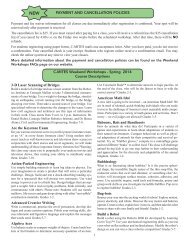
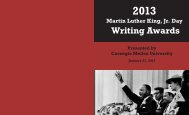
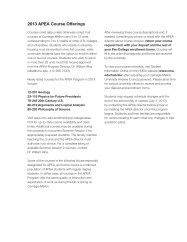
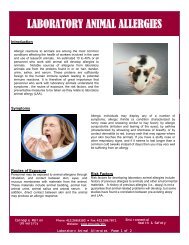
![Pittsburgh Neighborhoods [.pdf] - Carnegie Mellon University](https://img.yumpu.com/22011290/1/190x115/pittsburgh-neighborhoods-pdf-carnegie-mellon-university.jpg?quality=85)
![Curriculum Vitae [.pdf] - Carnegie Mellon University](https://img.yumpu.com/20737100/1/190x245/curriculum-vitae-pdf-carnegie-mellon-university.jpg?quality=85)
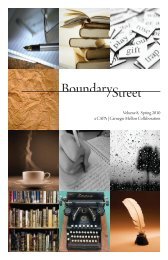
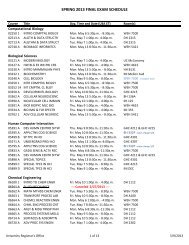
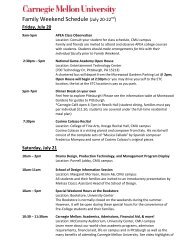
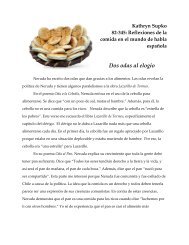


![May 2012 [.pdf] - Carnegie Mellon University](https://img.yumpu.com/12198417/1/190x253/may-2012-pdf-carnegie-mellon-university.jpg?quality=85)
